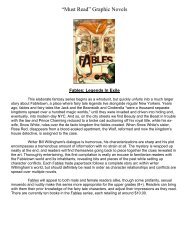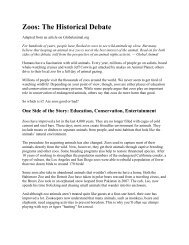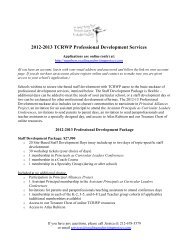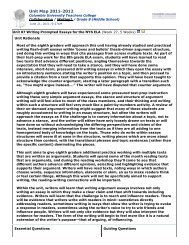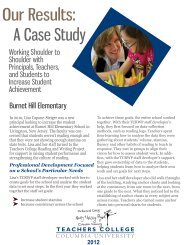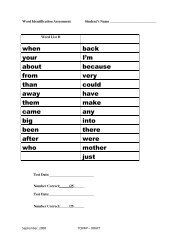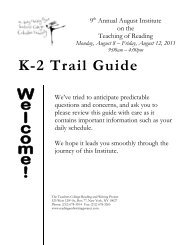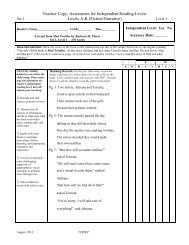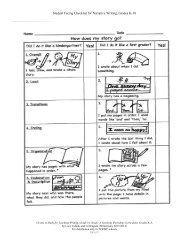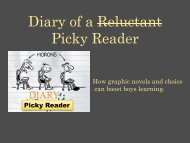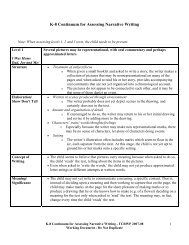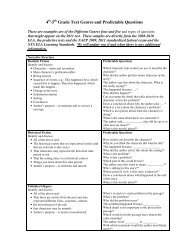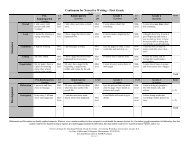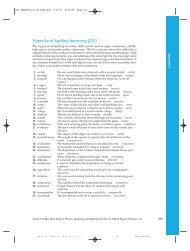2nd Grade Writing Unit 01 Launching with Nonfiction - The Reading ...
2nd Grade Writing Unit 01 Launching with Nonfiction - The Reading ...
2nd Grade Writing Unit 01 Launching with Nonfiction - The Reading ...
You also want an ePaper? Increase the reach of your titles
YUMPU automatically turns print PDFs into web optimized ePapers that Google loves.
<strong>Writing</strong> Curricular Calendar, Second <strong>Grade</strong>, 2<strong>01</strong>1-2<strong>01</strong>2 6informational writing, so we think it's a good idea to get your students writing nonfiction textsright off the bat. <strong>The</strong> challenge when teaching this unit is to make sure that you are not simplygiving students another month to write informational books, but that you are also ramping up thelevel of their informational writing. You will want to be sure that students enter this school yearrealizing that the expectation is not just that they dutifully fill up the pages of their booklets <strong>with</strong>facts that they know, but that instead, the expectation is that they actively, purposefully, worktoward making their writing better and better. You will want to acknowledge the All-about andexpert books that your students wrote in kindergarten and first grade, while at the same timeletting them know that as second grade writers they will be learning how to make these bookseven stronger. <strong>The</strong> writing students were able to do at the start of the school year—say, in theirfirst on-demand informational assessment—is the starting line, and each week, each month, thereshould be visible evidence that each student's writing has improved. It is especially importantthat now, at the very start of the year, each child sees his or her writing getting better, day byday, week by week, because if students start the year, seeing themselves outgrowing their oldselves in ways that are visible, then they'll develop expectations for that growth curve being thestatus quo for second grade.You might, for example, begin this portion of the unit by telling your students that you knowthey are accustomed to working <strong>with</strong> writing partners, but that you wanted to teach them thatgrown-up writers actually use partners in a really special way, and you thought maybe, justmaybe, there would be a few second graders who might be ready to use partners like theprofessional writers do. Of course, your entire class will be on their knees, insisting they're gamefor this, and <strong>with</strong> that drum roll you could point out the truth which is that grown-up writers lookhard to find writing partners who help us become better as writers. We know that a writingpartner who isn't just a "pat on the head, Good Girl" partner, but who says, "You can do evenmore than this!" and helps us to do that, is worth a million.It is important to recognize why writing partnerships are important, and you will want yoursecond grade writers to get this sense too. Partners can make pieces of writing—andwriters—better. To make sure this happens, you will want to give your students strategies thatallow their work in partnerships to pay off. You can teach students to take the responsibility oflistening to each others' work (and their own work) really seriously. Perhaps in partnershipmeetings, the writer will read aloud his or her writing, while the partner carefully listens andlooks on <strong>with</strong> the reader, offering suggestions to improve readability. You might, for instance,illustrate what you don't expect partners to do by showing what a disinterested partner mightlook like (leaning back in his or her chair, eyes scanning the room, yawning) and contrast that<strong>with</strong> a pantomime of an interested partner.In this bend, you will not only teach behaviors that allow for effective partnerships, but you willalso want to teach strategies to help your writers lift the informational books they are writing.You will want to recognize what your children have already learned while writing All-aboutbooks in kindergarten and first grade, so that you are acknowledging how you expect so muchmore now that they are second graders. Instead of teaching one way that partners can help oneanother to elaborate on a topic, you will want to teach your writers to ask questions to oneanother in order to prompt places where more elaboration is needed. This is a good time to teach<strong>Unit</strong> One – <strong>Launching</strong> <strong>with</strong> <strong>Nonfiction</strong><strong>Reading</strong> and <strong>Writing</strong> Project, 2<strong>01</strong>1 ©DRAFT



